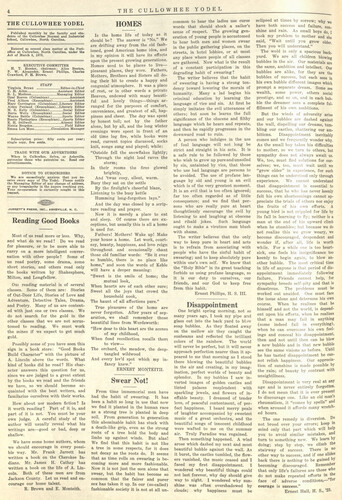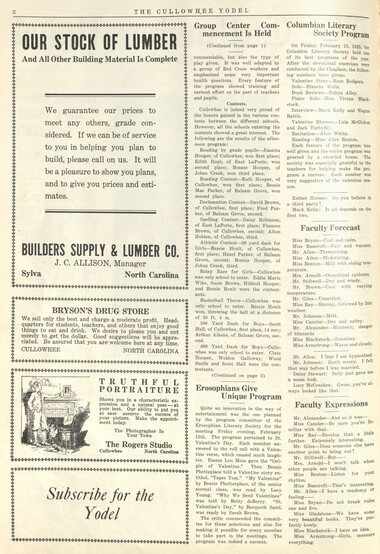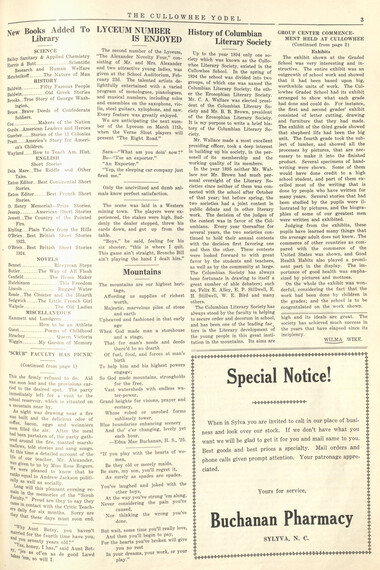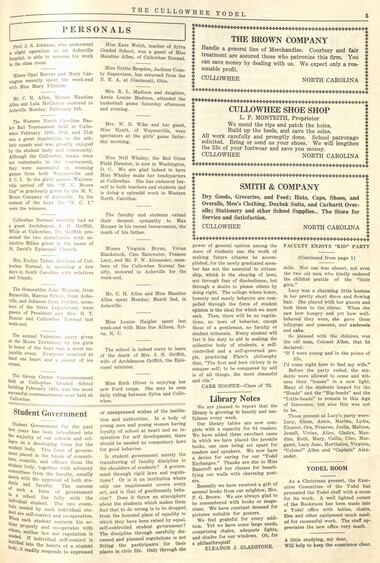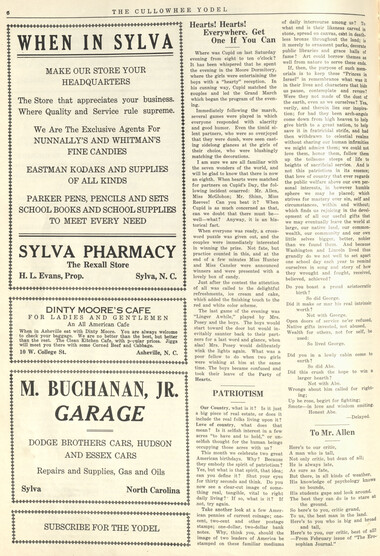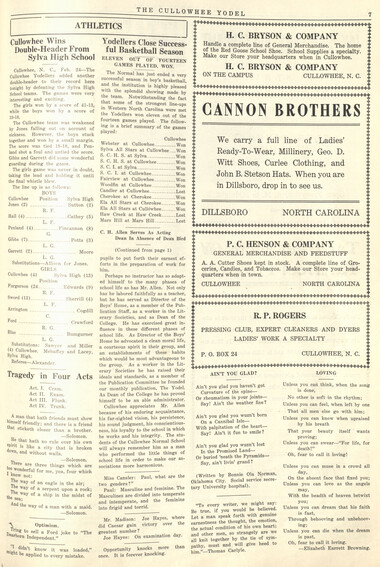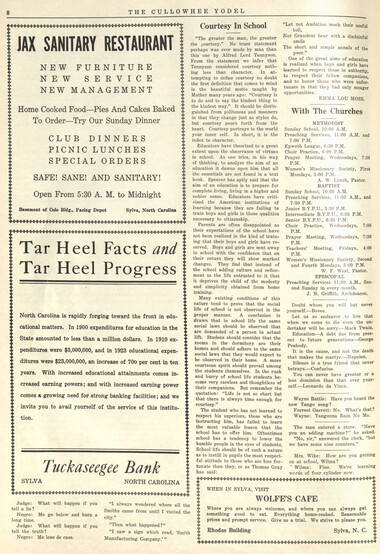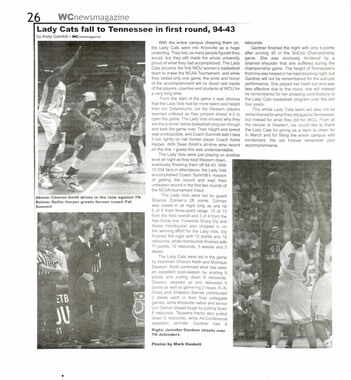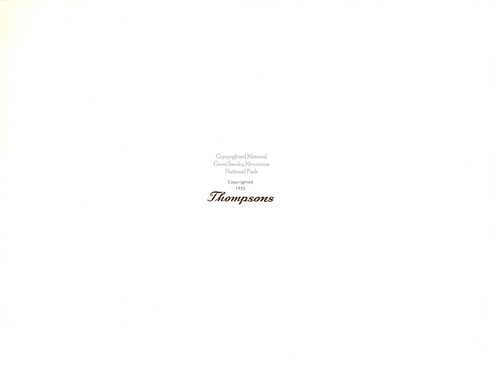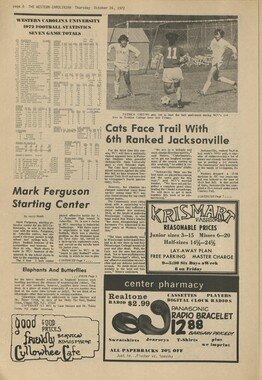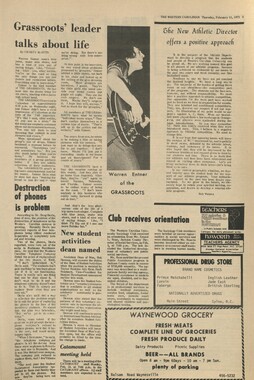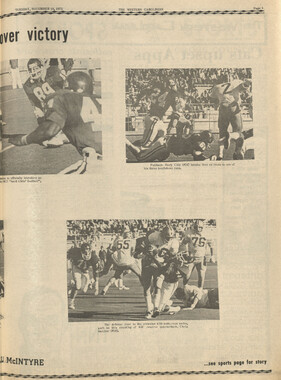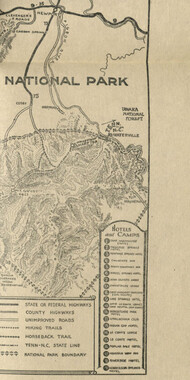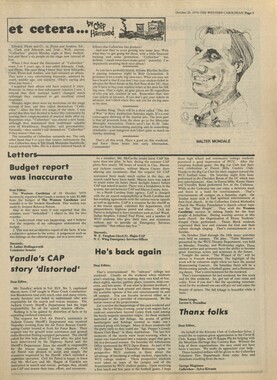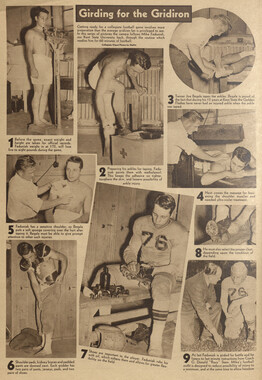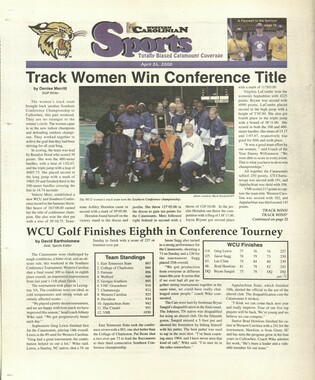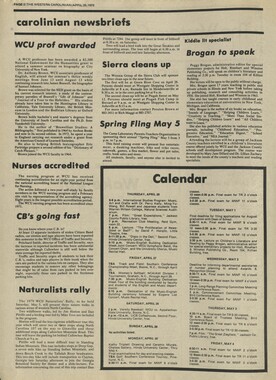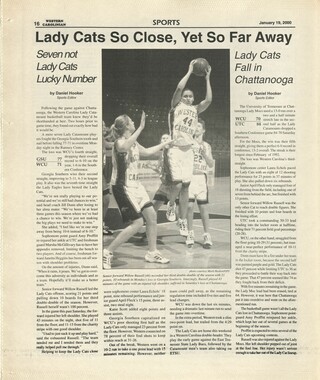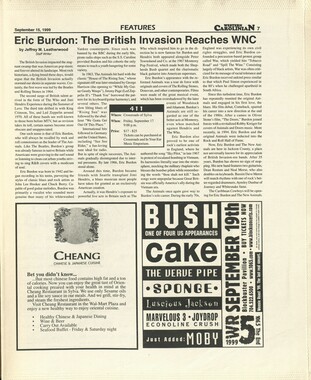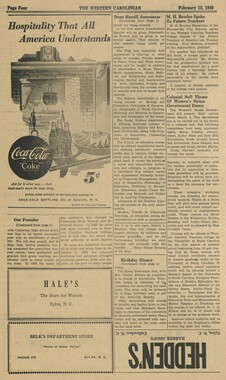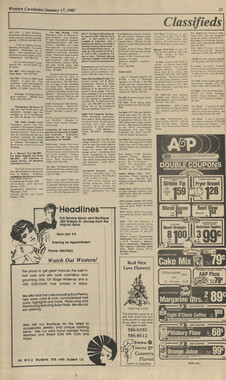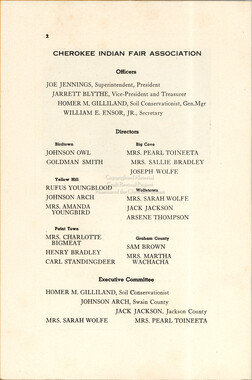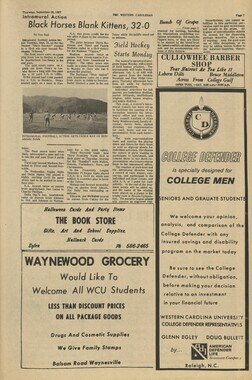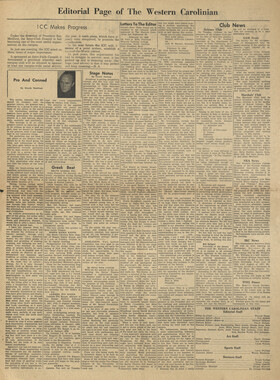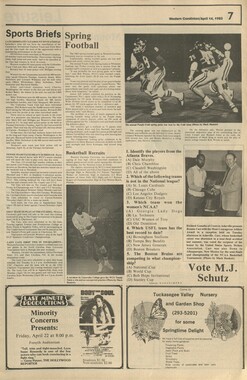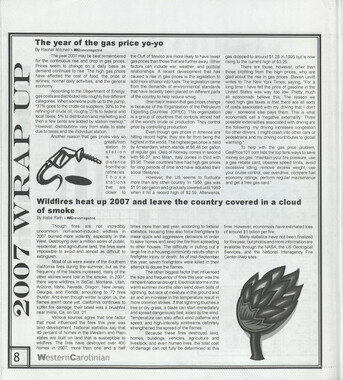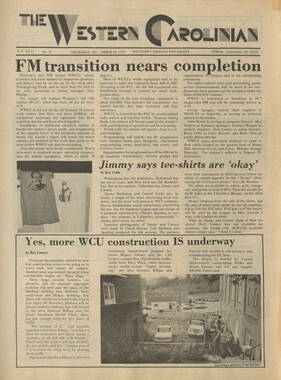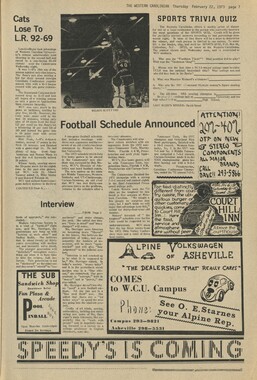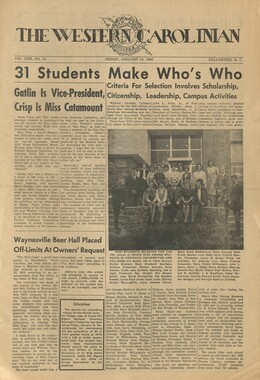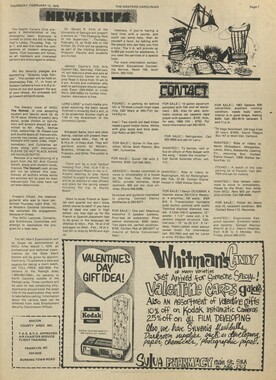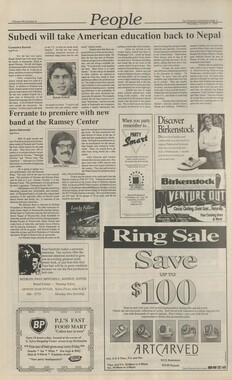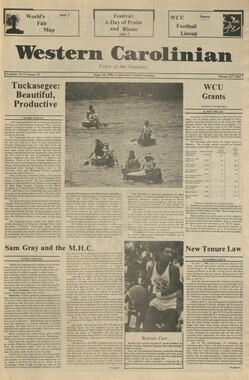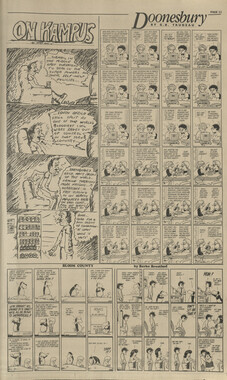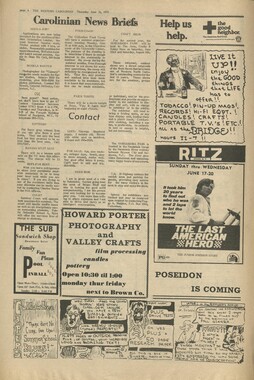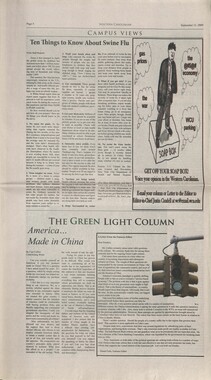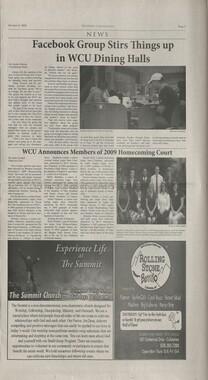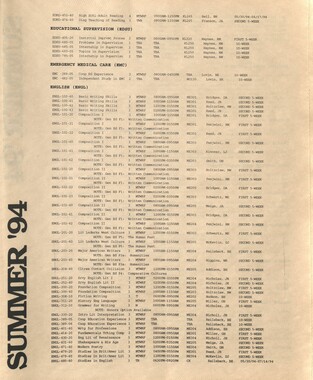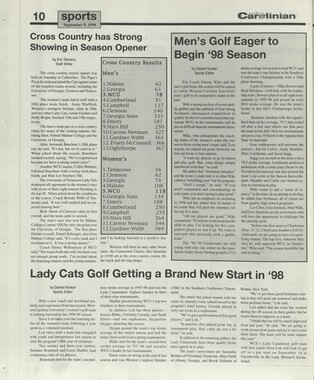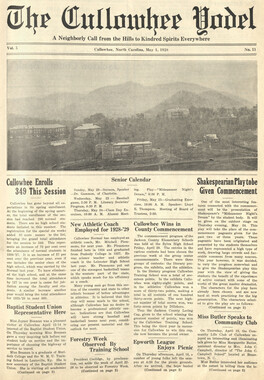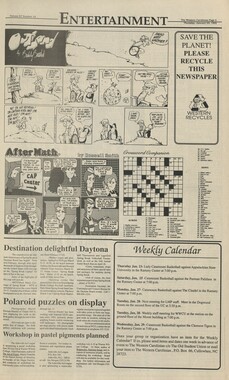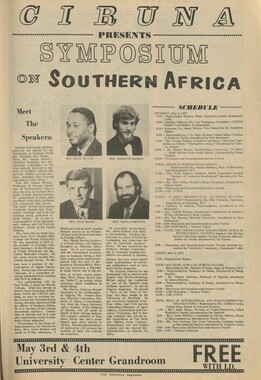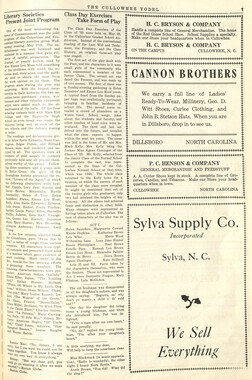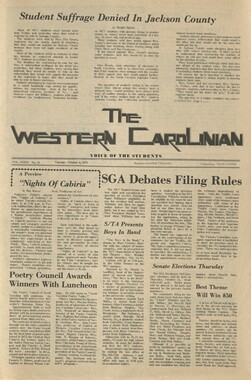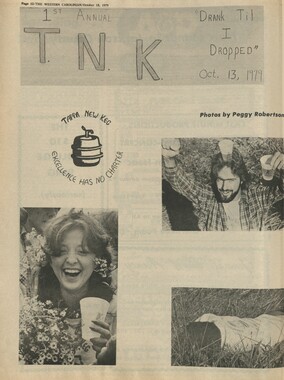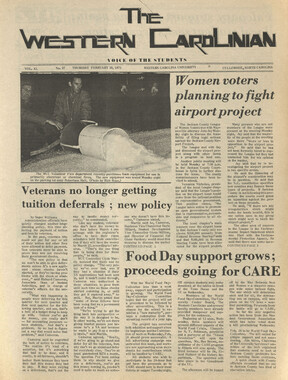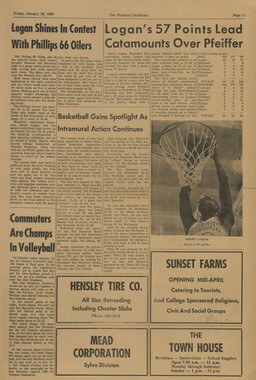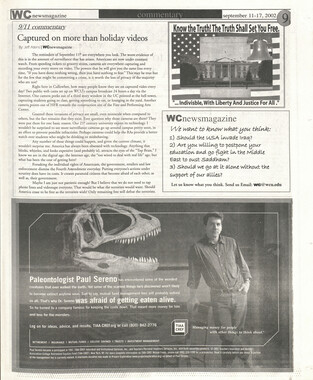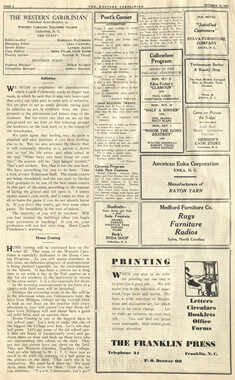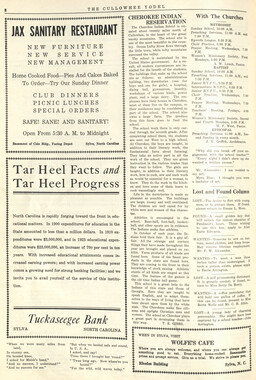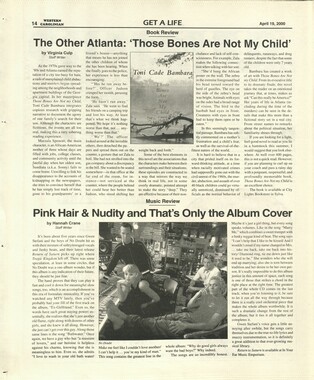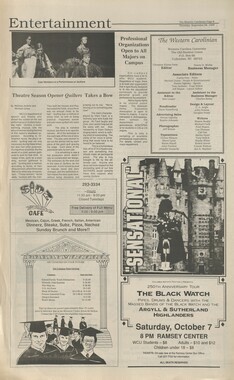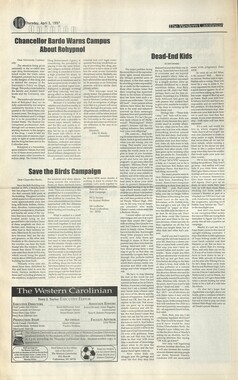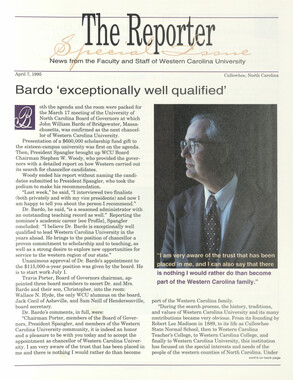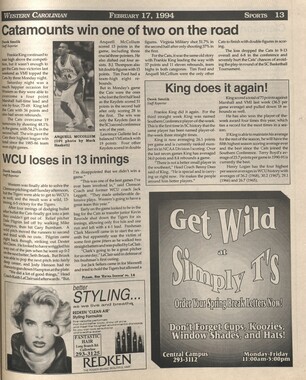Western Carolina University (20)
View all
- Canton Champion Fibre Company (2308)
- Cherokee Traditions (291)
- Civil War in Southern Appalachia (165)
- Craft Revival (1942)
- Great Smoky Mountains - A Park for America (2946)
- Highlights from Western Carolina University (430)
- Horace Kephart (941)
- Journeys Through Jackson (159)
- LGBTQIA+ Archive of Jackson County (85)
- Oral Histories of Western North Carolina (314)
- Picturing Appalachia (6798)
- Stories of Mountain Folk (413)
- Travel Western North Carolina (160)
- Western Carolina University Fine Art Museum Vitreograph Collection (129)
- Western Carolina University Herbarium (92)
- Western Carolina University: Making Memories (708)
- Western Carolina University Publications (2412)
- Western Carolina University Restricted Electronic Theses and Dissertations (146)
- Western North Carolina Regional Maps (71)
- World War II in Southern Appalachia (131)
University of North Carolina Asheville (6)
View all
- Allanstand Cottage Industries (62)
- Appalachian National Park Association (53)
- Bennett, Kelly, 1890-1974 (1388)
- Berry, Walter (76)
- Brasstown Carvers (40)
- Carver, George Washington, 1864?-1943 (26)
- Cathey, Joseph, 1803-1874 (1)
- Champion Fibre Company (233)
- Champion Paper and Fibre Company (297)
- Cherokee Indian Fair Association (16)
- Cherokee Language Program (22)
- Crowe, Amanda (40)
- Edmonston, Thomas Benton, 1842-1907 (7)
- Ensley, A. L. (Abraham Lincoln), 1865-1948 (275)
- Fromer, Irving Rhodes, 1913-1994 (70)
- George Butz (BFS 1907) (46)
- Goodrich, Frances Louisa (120)
- Grant, George Alexander, 1891-1964 (96)
- Heard, Marian Gladys (60)
- Kephart, Calvin, 1883-1969 (15)
- Kephart, Horace, 1862-1931 (313)
- Kephart, Laura, 1862-1954 (39)
- Laney, Gideon Thomas, 1889-1976 (439)
- Masa, George, 1881-1933 (61)
- McElhinney, William Julian, 1896-1953 (44)
- Niggli, Josephina, 1910-1983 (10)
- North Carolina Park Commission (105)
- Osborne, Kezia Stradley (9)
- Owens, Samuel Robert, 1918-1995 (11)
- Penland Weavers and Potters (36)
- Roberts, Vivienne (15)
- Roth, Albert, 1890-1974 (142)
- Schenck, Carl Alwin, 1868-1955 (1)
- Sherrill's Photography Studio (2565)
- Southern Highland Handicraft Guild (127)
- Southern Highlanders, Inc. (71)
- Stalcup, Jesse Bryson (46)
- Stearns, I. K. (213)
- Thompson, James Edward, 1880-1976 (226)
- United States. Indian Arts and Crafts Board (130)
- USFS (683)
- Vance, Zebulon Baird, 1830-1894 (1)
- Weaver, Zebulon, 1872-1948 (58)
- Western Carolina College (230)
- Western Carolina Teachers College (282)
- Western Carolina University (1899)
- Western Carolina University. Mountain Heritage Center (18)
- Whitman, Walt, 1819-1892 (10)
- Wilburn, Hiram Coleman, 1880-1967 (73)
- Williams, Isadora (3)
- Cain, Doreyl Ammons (0)
- Crittenden, Lorraine (0)
- Rhodes, Judy (0)
- Smith, Edward Clark (0)
- Appalachian Region, Southern (2569)
- Asheville (N.C.) (1923)
- Avery County (N.C.) (26)
- Blount County (Tenn.) (195)
- Buncombe County (N.C.) (1672)
- Cherokee County (N.C.) (283)
- Clay County (N.C.) (555)
- Graham County (N.C.) (233)
- Great Smoky Mountains National Park (N.C. and Tenn.) (519)
- Haywood County (N.C.) (3569)
- Henderson County (N.C.) (70)
- Jackson County (N.C.) (4804)
- Knox County (Tenn.) (35)
- Knoxville (Tenn.) (13)
- Lake Santeetlah (N.C.) (10)
- Macon County (N.C.) (420)
- Madison County (N.C.) (215)
- McDowell County (N.C.) (39)
- Mitchell County (N.C.) (132)
- Polk County (N.C.) (35)
- Qualla Boundary (981)
- Rutherford County (N.C.) (76)
- Swain County (N.C.) (2135)
- Transylvania County (N.C.) (270)
- Watauga County (N.C.) (12)
- Waynesville (N.C.) (86)
- Yancey County (N.C.) (72)
- Aerial Photographs (3)
- Aerial Views (60)
- Albums (books) (4)
- Articles (1)
- Artifacts (object Genre) (228)
- Bibliographies (1)
- Biography (general Genre) (2)
- Cards (information Artifacts) (38)
- Clippings (information Artifacts) (191)
- Copybooks (instructional Materials) (3)
- Crafts (art Genres) (622)
- Depictions (visual Works) (21)
- Design Drawings (1)
- Drawings (visual Works) (185)
- Envelopes (73)
- Exhibitions (events) (1)
- Facsimiles (reproductions) (1)
- Fiction (general Genre) (4)
- Financial Records (12)
- Fliers (printed Matter) (67)
- Glass Plate Negatives (381)
- Guidebooks (2)
- Internegatives (10)
- Interviews (815)
- Land Surveys (102)
- Letters (correspondence) (1013)
- Manuscripts (documents) (618)
- Maps (documents) (177)
- Memorandums (25)
- Minutes (administrative Records) (59)
- Negatives (photographs) (6015)
- Newsletters (1290)
- Newspapers (2)
- Notebooks (8)
- Occupation Currency (1)
- Paintings (visual Works) (1)
- Pen And Ink Drawings (1)
- Periodicals (193)
- Personal Narratives (10)
- Photographs (12976)
- Plans (maps) (1)
- Poetry (5)
- Portraits (4539)
- Postcards (329)
- Programs (documents) (151)
- Publications (documents) (2364)
- Questionnaires (65)
- Relief Prints (26)
- Sayings (literary Genre) (1)
- Scrapbooks (282)
- Sheet Music (2)
- Slides (photographs) (402)
- Songs (musical Compositions) (2)
- Sound Recordings (796)
- Specimens (92)
- Speeches (documents) (15)
- Tintypes (photographs) (8)
- Transcripts (322)
- Video Recordings (physical Artifacts) (23)
- Text Messages (0)
- A.L. Ensley Collection (275)
- Appalachian Industrial School Records (7)
- Appalachian National Park Association Records (336)
- Axley-Meroney Collection (2)
- Bayard Wootten Photograph Collection (20)
- Bethel Rural Community Organization Collection (7)
- Blumer Collection (5)
- C.W. Slagle Collection (20)
- Canton Area Historical Museum (2110)
- Carlos C. Campbell Collection (462)
- Cataloochee History Project (64)
- Cherokee Studies Collection (4)
- Daisy Dame Photograph Album (5)
- Daniel Boone VI Collection (1)
- Doris Ulmann Photograph Collection (112)
- Elizabeth H. Lasley Collection (1)
- Elizabeth Woolworth Szold Fleharty Collection (4)
- Frank Fry Collection (95)
- George Masa Collection (173)
- Gideon Laney Collection (452)
- Hazel Scarborough Collection (2)
- Hiram C. Wilburn Papers (28)
- Historic Photographs Collection (236)
- Horace Kephart Collection (861)
- Humbard Collection (33)
- Hunter and Weaver Families Collection (1)
- I. D. Blumenthal Collection (4)
- Isadora Williams Collection (4)
- Jesse Bryson Stalcup Collection (47)
- Jim Thompson Collection (224)
- John B. Battle Collection (7)
- John C. Campbell Folk School Records (80)
- John Parris Collection (6)
- Judaculla Rock project (2)
- Kelly Bennett Collection (1407)
- Love Family Papers (11)
- Major Wiley Parris Civil War Letters (3)
- Map Collection (12)
- McFee-Misemer Civil War Letters (34)
- Mountain Heritage Center Collection (4)
- Norburn - Robertson - Thomson Families Collection (44)
- Pauline Hood Collection (7)
- Pre-Guild Collection (2)
- Qualla Arts and Crafts Mutual Collection (12)
- R.A. Romanes Collection (681)
- Rosser H. Taylor Collection (1)
- Samuel Robert Owens Collection (94)
- Sara Madison Collection (144)
- Sherrill Studio Photo Collection (2558)
- Smoky Mountains Hiking Club Collection (616)
- Stories of Mountain Folk - Radio Programs (374)
- The Reporter, Western Carolina University (510)
- Venoy and Elizabeth Reed Collection (16)
- WCU Gender and Sexuality Oral History Project (32)
- WCU Mountain Heritage Center Oral Histories (25)
- WCU Oral History Collection - Mountain People, Mountain Lives (71)
- WCU Students Newspapers Collection (1843)
- Western North Carolina Tomorrow Black Oral History Project (69)
- William Williams Stringfield Collection (2)
- Zebulon Weaver Collection (109)
- African Americans (390)
- Appalachian Trail (35)
- Artisans (521)
- Cherokee art (84)
- Cherokee artists -- North Carolina (10)
- Cherokee language (21)
- Cherokee pottery (101)
- Cherokee women (208)
- Church buildings (172)
- Civilian Conservation Corps (U.S.) (111)
- College student newspapers and periodicals (1933)
- Dams (107)
- Dance (1023)
- Education (222)
- Floods (61)
- Folk music (1015)
- Forced removal, 1813-1903 (2)
- Forest conservation (220)
- Forests and forestry (1184)
- Gender nonconformity (4)
- Great Smoky Mountains National Park (N.C. and Tenn.) (181)
- Hunting (45)
- Landscape photography (25)
- Logging (119)
- Maps (83)
- Mines and mineral resources (8)
- North Carolina -- Maps (18)
- Paper industry (38)
- Postcards (255)
- Pottery (135)
- Railroad trains (72)
- Rural electrification -- North Carolina, Western (3)
- School integration -- Southern States (2)
- Segregation -- North Carolina, Western (5)
- Slavery (5)
- Sports (452)
- Storytelling (243)
- Waterfalls -- Great Smoky Mountains (N.C. and Tenn.) (66)
- Weaving -- Appalachian Region, Southern (280)
- Wood-carving -- Appalachian Region, Southern (328)
- World War, 1939-1945 (173)
Cullowhee Yodel Volume 02 Number 02
Item
Item’s are ‘child’ level descriptions to ‘parent’ objects, (e.g. one page of a whole book).
-
-
THE CULLOW HEE YODEL THE CULLOWHEE YODEL Published : dents of the monthly by the fat Cullowhee Normal whee, North Caroli: :ulty ami J ndustrial office at Cull Act of Marcl second class ir. owhee. North C i S, 1879. So, UN ;he P inder EXECUTIVE COM H. T. Hunter, chairmai P. W. Alexander, Ernest Crawford. F. H. Brown. Phillips, Benton, Charles STAFF inia Bryan Editor-in-Chief I. Allen._ . . Assistant Editor .. Madison Managing Editor I Keeves (Columbian) Assistant 1 Allison (Erosophian) y Carrington (Columbian).Literary Editor in Penland I Kr Iii.-un Literary Editor S. Kelly (Columbian I Soci: a Welis (Erosophian) Social Editor ne Battle (Columbian) Sports Editor ie Phetteplace (Erosophian) Sports Editor ll Alan e Brogdon -Fie\d. Editor Emma Lou Moss _. .- Circulatio n Mam iger ..■££ copy, five cents. pery TRADE WITH When in CuHow advertisements. OUR ADVERTISERS hee, Sylva, or Ashev ) patronize us. Read ille, NOTICE TO We are excaedingly anxioi ceive every copy of The Yode the Managing Editor of any cl or any irregularity in the pape Tour co-operation is earnestly sought in this Reading Good Books Most of us read more or less. Why, and what do we read? Do we read for pleasure, or to be more able to carry on a more intelligent conversation with other people? Some of us read poetry, some drama, some short stories, and others read only the books written by Shakesphere, Milton, and Longfellow. Oui reading material is of several classes. Some of them are: Stories of Out-Door Life, Stories of Love and Adventure, Detective Tales, Drama, and Poetry. Many of us are contented with just one or two classes. We do not search for the gold in the other classes that we are not accustomed to reading. We must work the mines if we expect to get much gold. Possibly some of you have seen this sign in a book store: "Good Books Build Character" with the picture of A. Lincoln above the words. What kind of books did he read? His character answers this question for us, since we are judged to a great extent by the books we read and the friends we have, so we should become acquainted with the best writers, and familarize ourselves with their works. How about uor modern fiction? Is it worth reading? Part of it is, and part of it is not. You must be your own judge. A careful study of the author will usually reveal what his writings are—good or bad, deep or shallow. We have some home authors, whom we should encourage in every possible way. Mr. Frank Jarrett has written a book on the Cherokee Indians. Mr. James H. Cathey has written a book on the life of A. Lincoln. Both of these men are from Jackson County. Let us read and encourage our home talent. R. Brown and E. Monteith. HOMES Is the home life of today as it should be? The answer is "No." We are drifting away from the old fashioned, good American home idea, and in my opinion it will have its effects upon the present growing generations. Homes used to be places to live— pleasant places, they were. Fathers, Mothers, Brothers and Sisters all doing their bit to create a happy and congenial atmosphere. It was a place of rest, or in other words a private Heaven, endowed with many beautiful and lovely things—things arranged for the purposes of comfort, convenience, and greatest of all, happiness and cheer. The day was spent by honest toil; not by the father alone, but by all, and the long winter evenings were spent in front of an old time log fire, while books were read, current topics discussed, socks knit, songs sung and played; while: "Outside fell the snowflakes lightly; Through the night loud raves the In their rooms the fires glowed brightly, And 'twas cosy, silent, warm. Busy they sat on the settle By the firelight's cheerful blaze, Listening to the busy kettle Humming long-forgotten lays." And the day was closed by a scripture reading and prayer. Now it is merely a place to eat and sleep. Of course there are exceptions, but usually this is all a home is used for. Fathers! Mothers! Wake up! Make your house a home. Let work, courtesy, beauty, happiness, and love reign throughout and occasionally chant those old familiar words: "Be it ever so humble, there is no place like home," and soon the words of Keble will have a deeper meaning: "Sweet is the smile of home; the mutual look, When hearts are of each other sure; Sweet all the joys that crowd the household nook, The haunt of all affections pure." True pleasures of the home are never forgotten. After years of separation, we shall remember those beautiful lines from Wordsworth: "How dear to this heart are the scenes of my childhood, When fond recollection recalls them to view— The orchard, the meadow, the deep- tangled wildwood And every lov'd spot which my infancy knew." ERNEST MONTEITH. common to hear the ladies use curse words that should shock a sailor's sense of respect. The growing generation of young people is accustomed to hear both men and women swear in the public gathering places, on the streets, in hotel lobbies, or at most any place where people of all classes are gathered. Now what is the result of a constant participation in this degrading habit of swearing? The writer believes that the habit of swearing is having a strong tendency toward lowering the morals of humanity. Many a lad begins his criminal education by learning the language of vice and sin. At first he simply imitates the evil utterances of others; but soon he learns the full significance of the obscene and filthy language which he hears and repeats, and then he rapidly progresses in the downward road to ruin. A person who indulges in the use of foul language will not long be strict and straight in his acts. It is a safe rule to be followed by those who wish to grow up pure and unsoiled by sin, untainted by vice, that those who use bad language are persons to be avoided. The use of profane language by old and young is an evil which is of the very greatest moment. It is an evil that is too often ignored; far too often regarded as of little consequence; and we find that persons who are really pure at heart thoughtlessly encourage the evil by listening to and laughing at obscene and ribald jokes. Such language ought to make a virutuos man blush with shame. The writer believes that the only way to keep pure in heart and acts is to refrain from associating with people who have the sinfui habit of swearing; and to keep absolutely pure within one's own self. We know that the "Holy Bible" in its great teaching forbids us using profane language, so it is our duty to ourselves, our friends, and our God to keep free from this habit. Ernest Phillips, H. S. III. Swear Not! From time immemorial men have had the habit of swearing. It has been a habit so long in use that now we find it planted in the human race as a strong tree is planted in deep soil. From generation to generation this abominable habit has stuck with a death-like grip, even as the strong roots of a tree hold the body and limbs up against winds. But alas! We find that this habit is not like a tree in some respects, for it does not decay as the roots do. It seems that as time rolls on swearing is becoming more and more fashionable. Now it is not just the men alone that swear, but the habit has become so common that the fairer and purer sex has taken it up. In our (so-called) fashionable society it is not at all un- Disappointment One bright spring morning, not so many years ago, I took my pipe and glass out into the back yard to bbw soap bubbles. As they floated away on the mellow air they caught the sunbeams and reflected the brilliant colors of the rainbow. The world will never be perfect, but it will never approach perfection nearer than it appeared to me that morning as I stood there blowing the beautiful bubbles in the air and creating, in my imagination, perfect worlds of beauty and splendor. In my bubbles I saw inverted images of golden castles and tinted palaces resplendent with sparkling jewels, and flowers of ineffable beauty. I dreamed of tender love, of peaceful contentment, of perfect happiness. I heard merry peals of laughter accompanied by sweetest music of a great orchestra, and the beautiful songs of innocent childhood were wafted to me on the summer air. Truly Paradise was regained. Then something happened. A wind arose which dashed my next and most beautiful bubble against the wall. As it burst, the castles tumbled, the flowers vanished, the music ceased and I faced my first disappointment. I wondered why beautiful things could not last forever, why day should give way to night. I wondered why sunshine was often overshadowed by clouds; why happiness must be eclipsed at times by sorrow; why we have both success and failure, sunshine and rain. As small boys do I took my problem to mother and she said, "Wait until you grow older. Then you will understand." The wold is only a spacious backyard. We are all children blowing bubbles in the air. Our materials are the same, ambition and intellect. Our bubbles are alike, for they are the bubbles of success, but each sees in his own bubble different images which prompt a separate dream. Some see wealth, some power, others social prestige, and so on, and in each bubble the dreamer sees a complete fulfillment of his own ambitions. But the winds of adversity arise and our bubbles are dashed against the wall, dispelling our dreams, tumbling our castles, shattering our ambitions. Disappointment inevitably comes and we frequently wonder why. As the small boy takes his difficulties to mother, so we turn to others, but sympathy does not always await us. We, too, must find solutions for ourselves; we, too, must wait until we "grow older" in experience, for such things can be understood only through experience. We cannot understand that disappointment is essential to success, that he who has never keenly felt his own shortcomings cannot appreciate the trials of others nor enjoy the fruits of his own efforts. A young bird is not crippled for life by its fall in learning to fly; neither is a man at the end of his upward climb when he stumbles; but because we do not realize this we grow weary, we become discouraged, despondent and wonder if, after all, life is worth while. For a while one is too heartsick, one feels his insignificance too keenly to begin again, to blow another bubble. The most critical time in life of anyone is that period of disappointment immediately following failure.. Friends cannot help, for sympathy breeds self-pity and that is disastrous. The problems must be worked out unaided. One must face the issue alone and determne his own course. When he realizes that he himself and not the world, is dependent upon his efforts, when he realizes that a man may fail in anything (some indeed fail in everything), when he can overcome his own feelings and conceal his disappointment, then and not until then can he blow a new bubble and in that new bubble see the same visions as before. Until he has tasted disappointment he cannot relish happiness. Our appreciation of sunshine is made possible by the rain; of beauty by contrast with unsightliness. Disappointment is very real at any age and is never entirely forgotten. I do not mean that it is ever present to discourage one. Like an old man's rheumatism, it "comes by spells" and when aroused it affords many wretched hours. The one remedy is diversion. D° not brood over your errors; keep m mind only that part which will help you to avoid similar mistakes, and turn to something new. We learn by doing; step by step, we climb the stairway of success. There is no other way to success, and if one slides back there is nothing to be gained by becoming discouraged. Remember that only life's failures are those who do not make repeated efforts in the face of adverse conditions,—"i°r
Object
Object’s are ‘parent’ level descriptions to ‘children’ items, (e.g. a book with pages).
-
The Western Carolinian is Western Carolina University’s student-run newspaper. The paper was published as the Cullowhee Yodel from 1924 to 1931 before changing its name to The Western Carolinian in 1933.
-

